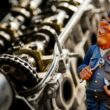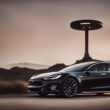Interview with Harald Kröger, Head of Development Electrics at Mercedes-Benz
Mercedes-Benz has announced that it will bring ten new plug-in hybrids onto the market by the end of 2017, including a fuel cell in series vehicles. And yet, when it comes to the lighthouse of e-mobility in the Mercedes-Benz segment, then only the name comes up Tesla. Mercedes-Benz relied on the collaboration with TESLA for its electric B-Class. In future, however, the company will go its own way when it comes to propulsion. mein-auto-blog spoke to the head of development for e-vehicles at Mercedes-Benz, Harald Kröger, at the Geneva Motor Show.
Tesla is no role model!
mab: What are your plans now after electromobility got a new boost in autumn thanks to Volkswagen use? I think that does matter, doesn't it?
Harald Kröger: I've read that many times. I don't really think so. There was already very good demand for our cars beforehand. The demand even more than exceeded our plans and we had short-term problems getting the parts at all.
mab: Their plug-in hybrids have a standard range, purely electric, of around 30 kilometers. Is not that clearly not enough?
 Harald Kröger: I would disagree with that too. I am a customer and user myself. For example, I live 20 kilometers away from work. I also took a photo of the instrument cluster. It then said: 600 kilometers driven, 0 liter consumption on average. So it's actually a question of the use case. Of course, if you have to commute 100 kilometers every day, then a plug-in may not be the right solution.
Harald Kröger: I would disagree with that too. I am a customer and user myself. For example, I live 20 kilometers away from work. I also took a photo of the instrument cluster. It then said: 600 kilometers driven, 0 liter consumption on average. So it's actually a question of the use case. Of course, if you have to commute 100 kilometers every day, then a plug-in may not be the right solution.
mab: With the PHEV in the mein-auto-blog editorship we manage just under 50 kilometers. There are also 100 km commute suddenly conceivable. Does not Mercedes-Benz have to refill here?
Harald Kröger: A little more range might be nice for some customers, but we're working on it. We have now also announced: Daimler is continuing to invest in battery technology. I think there is no other manufacturer who delves into technology as much as Mercedes-Benz.
mab: Could not that have made things easier by working closer together with TESLA instead of gilding their own shares on exit?
Harald Kröger: Tesla uses a special battery technology that is different from what all other OEMs are pursuing. This has a few advantages, but also a few disadvantages. My personal opinion is that the path we are treading, namely not using small consumer cells, but rather installing automotive cells, is the better way in the long term.
mab: But Mercedes-Benz is now gas. 10 to 17 new PHEV models, plus a hydrogen SUV and pure e-vehicles. So three new techniques.
Which one is the right one?
Harald Kröger: All three have their place. The plug-in hybrid is a very good technology for many customers who have certain usage situations. Pure EVs - and we're talking about both fuel cells and battery electrics - of course also have their customer bases. With fuel cells, you have the advantage of getting huge amounts of energy into your car in an incredibly short time. Even with the wildest fantasies that we can currently develop on the battery charging side, this will not be comparable in the future. There will always be customers who say: “I don't want to stand on the motorway for fifteen minutes. I just want to stand there for two minutes and fill up quickly.”
Every driver knows the feeling that you get a mental crisis when just one person stands in front of you at the gas station. Now imagine you are driving an electric car, you come to a charging station and there is someone standing in front of it. Then wait three quarters of an hour for it to drive away, and then wait another three quarters of an hour for it to load. In this respect the fuel cell naturally has a huge advantage. However, we have the challenge of creating costs that make both the customer and us happy. On the battery-electric side, it is important that we implement ranges that are absolutely competitive with any provider in the market. Nowadays, more reach still goes hand in hand with more costs, even if the costs are developing very dynamically in the right direction. It's about the right balance between range and costs and we therefore deal intensively with customer requirements, typical charging rhythms, etc. Here I would like to reopen the point that the plug-in hybrid has the advantage that it will eventually, if then the range gets bigger, maybe even 90 percent of the day can be covered completely electrically and then has both drives for long distances. I think that is a solid technique that will continue to exist. We see all three ways in the future.
mab: When is the “German TESLA” coming?
Harald Kröger: Technologically speaking, Tesla is not offering a revolution. On the drive side, for example, I don't see any extremely advanced technology. But it is a revolutionary company. I value the Tesla company very highly. I really appreciate my colleagues and what they have achieved is a great thing. That's why we were able to work well together, because Daimler has also proven very often that we are a brave company. I'll start with the smart concept myself. The car, which was shown for the first time in 1997, is still one of the bravest cars ever built for me. But I also come out as a smart fan, so I'm probably not completely neutral. So I don't think we have to learn courage either. What Tesla did really well is that they showed that there was a segment there that no one had addressed before. Everyone else addressed the city car on the electrical side. They built another car.
We took up this impulse - and I can already say today: We will make e-cars that will make the customers out there very happy!
mab: Mr. Kröger, wWe thank you for the interview.
[=” ” ]
About Harald Kröger:
After graduating with a Master of Science degree from Stanford University in the USA, he began his career in 1995 at what was then Daimler-Benz AG in the field of radar sensors. After various staff functions and positions in production, he took over the management of electrics / electronics purchasing for Mercedes-Benz cars in 2003. In 2008, he became head of quality at Mercedes-Benz Cars. Since May 2012, Harald Kröger has headed the Electrical / Electronics & E-Drive Development Department at Mercedes-Benz Cars.




